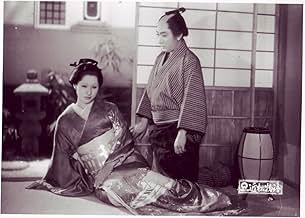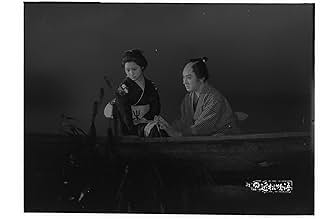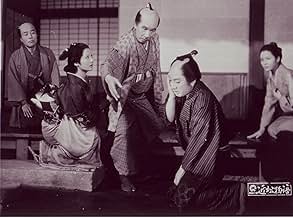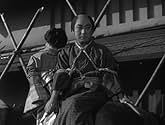CALIFICACIÓN DE IMDb
8.0/10
5.2 k
TU CALIFICACIÓN
Ishun es un rico escribano que acusa falsamente a su esposa y su mejor empleado de tener una aventura.Ishun es un rico escribano que acusa falsamente a su esposa y su mejor empleado de tener una aventura.Ishun es un rico escribano que acusa falsamente a su esposa y su mejor empleado de tener una aventura.
- Dirección
- Guionistas
- Elenco
- Premios
- 1 premio ganado y 2 nominaciones en total
Eitarô Ozawa
- Sukeemon
- (as Sakae Ozawa)
Opiniones destacadas
Set in 17th century Japan, and based on a 1715 play by Chikamatsu Monzaemon (hence the title, 'A Story From Chikamatsu'), this film starts with a rich scroll-maker (Eitarō Shindō) refusing to give his wife (Kyōko Kagawa) money. When she turns to one of his top apprentices (Kazuo Hasegawa), she sets in motion of a chain of events that ultimately have them fleeing together, because the apprentice, normally a virtuous man, intended to take the money from the scroll-maker and was caught.
The story reveals emotion and desire that is both on the surface, such as the scroll-maker sexually harassing a young servant (Yōko Minamida), as well as that which is concealed. It shows us the randomness of events which may cause everything to suddenly change in one's life; as the wife puts it at one point, "Nothing is more unpredictable than a person's fate. In just one day, all of this has happened to us." If you've ever had your life flip suddenly because of love, you'll identify.
The film also shows the all-too-common fate of women; the advice given to the young servant being harassed is to "Just take it. That's the duty of an employee." Adultery is also blamed first and foremost on the women ("It's frightening what women are capable of"), and it's ominous when a couple of adulterers are being led through the town to be crucified early on in the film.
It's a solid film throughout – the cast is strong, the story is well told, and there are some gorgeous scenes, one of which is in a bamboo forest. I don't think it's going to blow you away, but it's a good one.
The story reveals emotion and desire that is both on the surface, such as the scroll-maker sexually harassing a young servant (Yōko Minamida), as well as that which is concealed. It shows us the randomness of events which may cause everything to suddenly change in one's life; as the wife puts it at one point, "Nothing is more unpredictable than a person's fate. In just one day, all of this has happened to us." If you've ever had your life flip suddenly because of love, you'll identify.
The film also shows the all-too-common fate of women; the advice given to the young servant being harassed is to "Just take it. That's the duty of an employee." Adultery is also blamed first and foremost on the women ("It's frightening what women are capable of"), and it's ominous when a couple of adulterers are being led through the town to be crucified early on in the film.
It's a solid film throughout – the cast is strong, the story is well told, and there are some gorgeous scenes, one of which is in a bamboo forest. I don't think it's going to blow you away, but it's a good one.
This film was near the end of a wonderful sequence of films made near the end of his life by Mizoguchi. As Tony Raines says in the DVD extra for the Masters of Cinema edition this was a studio project that he was not wholly enthusiastic about. This shows a little in the film as it lacks some of the real flair and emotional power of some of his earlier great films. However, it shares with them his wonderful flowing camera and great cinematography. Its also a terrific story, based originally on a story from the great Japanese 17th Century playwright Monzaemon Chikamatsu (hence the Japanese name, A Tale from Chikamatsu). The screenplay is skillfully worked from the original story, which depends a lot of some pretty unlikely coincidences.
The film has a great cast, although the lead actor (and major star at the time) Kazuo Hazegawa is a little old for the role of the shy lover. Kyoko Kagawa is great as the wife of a powerful merchant who is mistakenly accused of having an affair with her servant, but then falls in love with him as they both go on the run.
As you'd expect from a Mizoguchi film, technically it is flawless, with lovely sets and some beautiful camera work. The Masters of Cinema version on DVD is a beautiful restoration. For Mizoguchi fans, this film is well worth getting, but for those who haven't seen many of his films it would be better to start with some of his earlier masterpieces.
The film has a great cast, although the lead actor (and major star at the time) Kazuo Hazegawa is a little old for the role of the shy lover. Kyoko Kagawa is great as the wife of a powerful merchant who is mistakenly accused of having an affair with her servant, but then falls in love with him as they both go on the run.
As you'd expect from a Mizoguchi film, technically it is flawless, with lovely sets and some beautiful camera work. The Masters of Cinema version on DVD is a beautiful restoration. For Mizoguchi fans, this film is well worth getting, but for those who haven't seen many of his films it would be better to start with some of his earlier masterpieces.
I never heard of Mizoguchi's "Chikamatsu monogatari" before until a friend of mine who loves Mizoguchi's films showed it to me recently. It is a beautiful, haunting, and emotionally involving study of forbidden love between a rigid merchant's wife, Osan, and her devoted servant, Mohei, in 17th century Kyoto. The lovers are unfairly punished for having an affair; Osan escapes her husband's home while Mohei is forced into exile. "Chikamatsu" is a highly charged work, but I'm not entirely sure if I would call it a masterpiece on par with "Zangiku monogatari", "The Life of Oharu", "Ugetsu", "Sansho dayu", and "Princess Yang Kwei Fei" - Mizoguchi's richest and most beautiful films. The photography is extraordinarily ravishing and evocative, with Mizoguchi's masterful fluid camera. Also, the sound quality of "Chikamatsu" is interestingly rich and astounding, but the film doesn't stay with you for a while like those aforementioned films. Overall, this is a minor Mizoguchi: beautiful and haunting at times, but inferior to his renowned masterpieces.
I saw this over 20 years ago and I remember it well. Superb photography. Great acting by the 2 leads. How things were different in that era compared to today in Japan. This is probably very hard to find on video if it exists at all. But you may see it in art houses like I did. Another Mizoguchi classic. If you like his work, I recommend The Human Condition, the greatest film ever made.
This is adapted from a work by Chikamatsu Monzaemon, one of the defining writers from the early Tokugawa era. His name often reaches us in the contours of a Japanese Shakespeare and as usually with these Western imports to explain Eastern art, it is mostly a lazy comparison. Unlike Shakespeare who continues to inspire a steady flow of film, Chikamatsu's name has been largely neglected however; there is this, and films by Uchida, Shinoda, and Yasuzo Masumura, 'shunji'/double-suicide stories that were Chikamatsu's forte, each enlivened in its own way by the intensity of vibrant artifice and a story of forbidden passions cleansed by death.
So film-wise, the heart of these things has been extrapolated from where centuries of concentrated practice refined them, in the stages of kabuki or bunraku, both of which featured elaborate contraptions for generating illusions. The stage having been set, it was all a matter of achieving a cinematic mobility around it. Shinoda made the most clever simple use of that stage in Double Suicide; he was essentially filming what domestic audiences had enjoyed for centuries on the stage of bunraku as part of unbroken tradition, but trusting our eye to be naturally dislocated the right distance to absorb this as a puzzling modernity.
It is not unlike what has happened with Mizoguchi; a visual purity from tradition dislocated, thus obscured, through Western interpretations.
But let's backtrack a little. We know that Chikamatsu abandoned kabuki for the puppet theater of bunraku, an author's theater, with pliable actors held on strings and the gods that move the world made visible. There he worked in favour of better integrated audience manipulation, in favour of an idealized realism sprung from the author's mind.
So here we have a film about a scroll-maker, himself an artist charged with cultivating idealized images, fighting against the idealized reality he has helped cultivate in a quest for the true love he had all his life sublimated into perfect service.
It is very similar to Oharu in this way; the film structured around the tension that rises from characters performing idealized roles and the tortured heart that gives rise to them. There is a master printer who cultivates the image of the noble benefactor but who is a cruel deceiving scumbag. Nobles who act magnanimous in the open but then use their position to barter for money. The rival printer who feigns congratulations or compassion but who is secretly plotting for the imperial position.
So this idealized world that Chikamatsu advocated and in a small part helped cultivate, Mizoguchi posits to be a system of organized oppression with victims its own characters.
But it is in thrusting through this world of idealized, thus largely fictional appearances, that the two lovers can finally realize feelings that were socially prohibited. In this fictional world true beauty, a love fou, is realized by shedding the artificial. As it turns out, the two of them become the couple they were groomed to be.
As usual with Mizoguchi, the narrative on the surface level is never less than obvious. It is clean, disarmingly earnest. It seems like the film does not demand anything of us. But beneath the controlled histrionics, there is a heart of images that beats with abstract beauty.
The final image is of the two lovers publicly declaring love by simply standing together. It is again clean but resonates outsid the narrative. Their fate is sealed, but the image no longer cultivated but naturally arisen now has the chance to blossom across the audience of curious onlookers. It is an image with the power to inspire change.
Mizoguchi is not a filmmaker I can deem personal. But he's a remarkable study just the same.
So film-wise, the heart of these things has been extrapolated from where centuries of concentrated practice refined them, in the stages of kabuki or bunraku, both of which featured elaborate contraptions for generating illusions. The stage having been set, it was all a matter of achieving a cinematic mobility around it. Shinoda made the most clever simple use of that stage in Double Suicide; he was essentially filming what domestic audiences had enjoyed for centuries on the stage of bunraku as part of unbroken tradition, but trusting our eye to be naturally dislocated the right distance to absorb this as a puzzling modernity.
It is not unlike what has happened with Mizoguchi; a visual purity from tradition dislocated, thus obscured, through Western interpretations.
But let's backtrack a little. We know that Chikamatsu abandoned kabuki for the puppet theater of bunraku, an author's theater, with pliable actors held on strings and the gods that move the world made visible. There he worked in favour of better integrated audience manipulation, in favour of an idealized realism sprung from the author's mind.
So here we have a film about a scroll-maker, himself an artist charged with cultivating idealized images, fighting against the idealized reality he has helped cultivate in a quest for the true love he had all his life sublimated into perfect service.
It is very similar to Oharu in this way; the film structured around the tension that rises from characters performing idealized roles and the tortured heart that gives rise to them. There is a master printer who cultivates the image of the noble benefactor but who is a cruel deceiving scumbag. Nobles who act magnanimous in the open but then use their position to barter for money. The rival printer who feigns congratulations or compassion but who is secretly plotting for the imperial position.
So this idealized world that Chikamatsu advocated and in a small part helped cultivate, Mizoguchi posits to be a system of organized oppression with victims its own characters.
But it is in thrusting through this world of idealized, thus largely fictional appearances, that the two lovers can finally realize feelings that were socially prohibited. In this fictional world true beauty, a love fou, is realized by shedding the artificial. As it turns out, the two of them become the couple they were groomed to be.
As usual with Mizoguchi, the narrative on the surface level is never less than obvious. It is clean, disarmingly earnest. It seems like the film does not demand anything of us. But beneath the controlled histrionics, there is a heart of images that beats with abstract beauty.
The final image is of the two lovers publicly declaring love by simply standing together. It is again clean but resonates outsid the narrative. Their fate is sealed, but the image no longer cultivated but naturally arisen now has the chance to blossom across the audience of curious onlookers. It is an image with the power to inspire change.
Mizoguchi is not a filmmaker I can deem personal. But he's a remarkable study just the same.
¿Sabías que…?
- TriviaThe movie is based on a play by the classic Japanese author Monzaemon Chikamatsu (1653-1725). The original title "Chikamatsu monogatari" means "A Tale From Chikamatsu".
- ConexionesFeatured in Histoire(s) du cinéma: Toutes les histoires (1988)
Selecciones populares
Inicia sesión para calificar y agrega a la lista de videos para obtener recomendaciones personalizadas
- How long is A Story from Chikamatsu?Con tecnología de Alexa
Detalles
- Fecha de lanzamiento
- País de origen
- Idioma
- También se conoce como
- A Story from Chikamatsu
- Productora
- Ver más créditos de la compañía en IMDbPro
Taquilla
- Total a nivel mundial
- USD 9,311
- Tiempo de ejecución1 hora 42 minutos
- Color
- Relación de aspecto
- 1.37 : 1
Contribuir a esta página
Sugiere una edición o agrega el contenido que falta

Principales brechas de datos
By what name was Chikamatsu monogatari (1954) officially released in India in English?
Responda





























